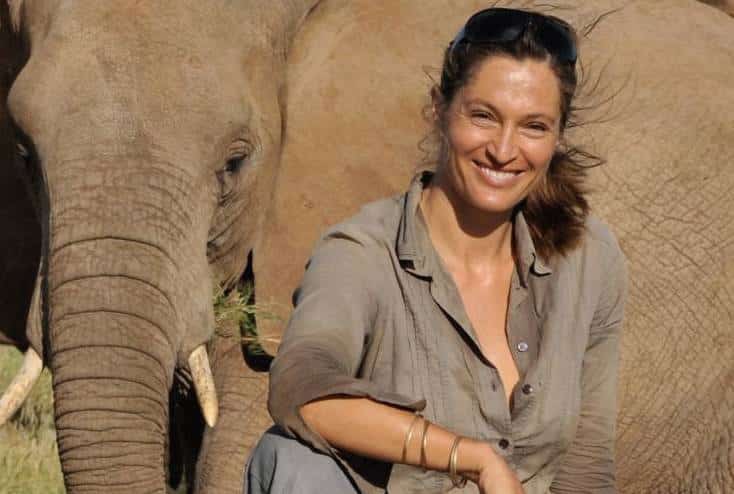Known to millions of viewers for This Wild Life and Big Cat Diaries, you’ll be entertained with animal stories and intimate behind the scenes tales of her life in Kenya with her young family. Saba was born in the Great Rift Valley in Kenya on June 7 at 7pm on the seventh day of the week and became the 7th grandchild in the family. Her name means ‘seven’ in Kiswahili. When she was six weeks old she met her first wild elephant, one of approximately 400 living in the Lake Manyara National Park in Tanzania that her father, Iain Douglas Hamilton, was studying. As a child her first language was Kiswahili. Saba lives in Kenya with her husband and three children and runs the family’s tented eco-lodge, Elephant Watch Camp
How did you get involved with the camp?
My husband Frank and I wanted our kids to experience bush living properly, so taking the decision for me to run Elephant Watch Camp was relatively easy as Frank was already heavily involved in Samburu National Reserve through Save the Elephants.
Was it a difficult decision to take over this camp with a young family in tow?
Not really. I was going a bit mad being a ‘mum in the suburbs’, especially after the twins were born. My life pre-kids was very adventurous and mostly in wild places, as was my husband’s, so we were both pining for a bit of wilderness.
How is family life in the busy it different from ‘normal’ family life?
Family life in Samburu is pretty similar to normal life elsewhere. You have to make meals, brush teeth, figure out day-care, read bedtime stories, and convince the kids to have a bath! They still say the food is yucky, and yowl at us when they’re annoyed. It’s just set in a slightly different context. While our kids have no problems feeding warthogs or giraffes by hand, but they are absolutely terrified of dogs!
On the face of it, you are raising your children in what people might consider a ‘dangerous’ environment. I feel much safer raising my kids in Samburu National Reserve than I do in urban Nairobi. And when we go to a big city like London, it’s mayhem as they have no idea how to behave on pavements or about the dangers of traffic. So, depending on where you are raised, you either learn to be street-wise or bush-wise. What’s important is to know a bit about both.
What do your kids get out of it?
Living amongst Samburu nomads is the most incredible education for the kids – they absorb absolutely everything they see and hear, and just by living in the bush are learning all about the animals, bugs and birds, what they eat, where to find them, what their footprints or dung looks like, where they nest, how to identify their songs. I’m constantly surprised by what comes out of their mouths. All of the kids speak Kiswahili (it’s actually their preferred language amongst themselves) but the twins (now 3) also understand Samburu and will happily translate for me. In fact, someone very naughty has taught them to swear like troopers in Kisamburu, which has all of the warriors rolling on the floor, but luckily none of us know what they are saying! Selkie (5) is the most amazing little guide, explaining to our guests how to sex elephants by looking at the shape of their foreheads, or where the hornbills make their nests and why.
We didn’t bring many toys with us, so like Samburu kids they started making their own. Mainly wrapping up the great sausage-like seeds from the Kigelia trees to use as dolls. We then drew some faces on them to make them more lovable.
April 20 7.30pm,
Assembly Hall Theatre
£17.50/15.50 + booking fee
01892 530613
www.assemblyhalltheatre.co.uk








